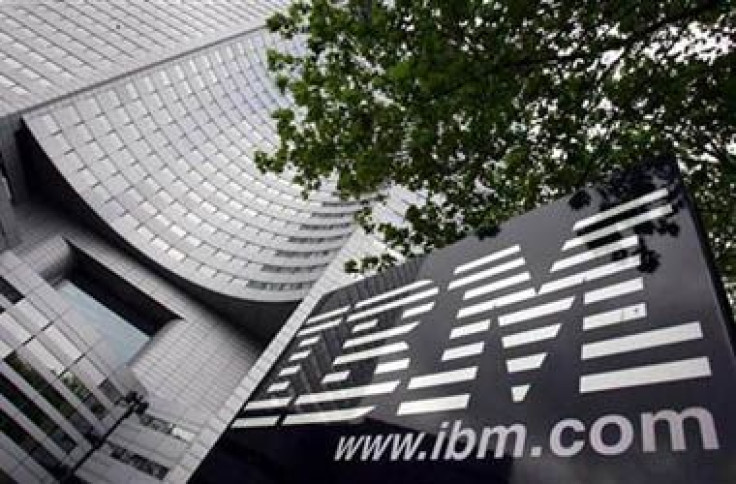IBM Maps Out Big Data For Retailers And Pitches Watson Supercomputer: New York NRF Big Show

Before a gathering of international retailers in New York Monday, International Business Machines Corp. (NYSE:IBM) CEO Ginni Rometty estimated that a staggering 2.5 billion gigabytes of data is created each day, providing raw material for the intense business interest in "big data" among retailers and other firms.
IBM’s estimates here seem credible, since its key businesses include big data analytics for retailers and other companies, alongside corporate cloud computing services.
Rometty compared the importance of data for modern business to industrial revolutions worked by steam, electricity, and hydrocarbons in past centuries. Big data has grown so large that unfamiliar byte-size computing terms – like petabytes and exabytes, designating 1,000 terabytes and 1 billion gigabytes respectively – have been coined.
Industrial Internet applications – where unlikely candidates like refrigerators, ovens or wristbands are connected to online networks – alongside ever more popular social networks and smartphones have fueled this explosion in data, she said.
“Eighty percent of the world’s data has been created in the past two years,” added Rometty.
Interest in big data is not new, though credible estimates of the size of the universe covered by this umbrella term are relatively rare. IT giants like Microsoft Corporation (NASDAQ:MSFT), Oracle Corporation (NYSE:ORCL) and IBM have worked to exploit this niche industry in the past few years, spending billions on acquisitions of smaller data specialists, reported The Economist in 2010.
But Rometty saw strong synergy between retailers and big data, a relatively new intersection that has grown quickly since about 2011, and which has sped up as brick-and-mortar retailers track shopper behavior in-store. New York’s Big Show retail trade conference, where Rometty spoke, is a case in point – dozens of startups and more established companies like Cisco Systems Inc. (NASDAQ:CSCO) showcased their analytics technology to retailers, in hopes of hooking new clients.
Rometty urged retailers to make use of big data, and warned them that failing to accept it could destroy their competitiveness.
“Information is going to the the basis of competition for your entire industry, no matter what you do,” she told thousands of retailers in a keynote speech at the National Retail Federation’s annual trade show.
A new specialized position – the chief data officer or CDO – may also come into vogue as companies adapt to a newfound emphasis on data, according to Rometty. Banks have already considered or implemented this, she said.
“I do see something a number of customers and clients are starting to do – we’ll see if it really catches on in the long term – chief data officer,” she said.
IBM sells big data and information technology services to corporations as well as consumers, and has expanded its reach in the former category in recent years, so the remarks could be seen as IBM hyping its own wares.
Rometty also demonstrated a retail application of the company’s Watson supercomputer technology, which famously beat Jeopardy champions on the trivia show on live TV in 2011. That involved a walkthrough of outdoor gear seller The North Face Inc.’s website, touting technology from tech firm Fluid, which involved Watson smartly answering open-ended questions from shoppers.
IBM’s Watson unit is an example of a cognitive computer system, or a self-learning system which can tweak itself with little human input. Rometty hailed cognitive systems as the next big wave in computing innovation.
But her remarks are also a play to boost confidence in Watson’s viability as a money-making business. The Watson project has made only $100 million in revenues to date, despite ambitious internal projections targeting $10 billion annually within 10 years, reported the Wall Street Journal last week.
Since that report, IBM has announced that it would pour an extra $100 million into Watson-related businesses and develop an expanded business unit for the supercomputer, which has been deployed mostly in medical fields to date.
After a recent soft launch, more than a thousand companies or individuals applied to build apps related to Watson’s technology, according to Rometty. The supercomputer, which can form and test hypotheses as well as recommend medical treatments, will make a renewed push into travel, retail and financial applications shortly, though the exact rollout timetable wasn’t specified.
It takes seven to 15 years for just-published medical knowledge to turn into widespread practice among doctors, Rometty estimated. Watson’s advent should speed up that process significantly, as the machine has digested much existing medical literature and can churn out diagnoses and treatments rapidly.
© Copyright IBTimes 2024. All rights reserved.












